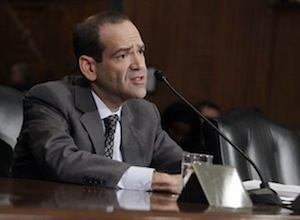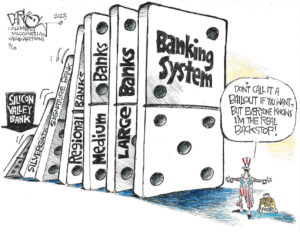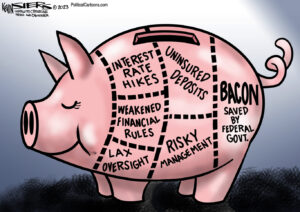Truthdigger of the Week: Ex-TARP Investigator Neil Barofsky
In late 2008, Neil Barofsky was appointed the Treasury Department’s investigator of the bank bailouts. In the time since, he has suffered dismissal and deprecation from his colleagues and the corporations they're supposed to regulate.Since he was appointed to investigate the bank bailouts in 2008, Neil Barofsky has suffered dismissal and deprecation from his colleagues and the banks they're supposed to regulate.
In late 2008, Neil Barofsky was appointed the Treasury Department’s investigator of the bank bailouts. In the time since, he has suffered dismissal and deprecation from his colleagues and the corporations they’re supposed to regulate. But Barofsky persevered, and his experience is the subject of his new book: “Bailout.”
As inspector general of the Treasury’s $700 billion TARP [Troubled Asset Relief Program], Barofsky’s job was to learn how the big banks were using the taxpayer money the government supplied to bail them out. Specifically, his task was to uncover “fraud, waste and abuse.” He was well chosen for the work. Before Barofsky was tapped for his investigative role, he spent over eight years prosecuting white-collar criminals and Latin American drug lords in New York.
Under Barofsky’s leadership, SIGTARP (the office of the Special Inspector General for TARP), published nine quarterly reports and 13 audits. By February 2011, he had charged a few dozen people with civil or criminal fraud, won 14 convictions and recovered $150 million in taxpayer money.
His investigations also confirmed the lopsidedness between what financial institutions got out of the bailouts and what homeowners were given. American Express, for example, was awarded $3.7 billion during the crisis, while only $1 billion was spent on homeowners during Barofsky’s time as investigator.
For 16 months, Barofsky endured stubborn opposition to his work. In a town (Washington, D.C.) and organization (the U.S. government) where almost everyone appears to be engaged in some measure of chicanery — if not outright deception — Barofsky was appointed to follow trails of suspected wrongdoing and alleged criminality wherever he found them. His peers advised caution. “After canvassing other inspector generals for guidance,” The New York Times wrote in 2010, “… he learned of different priorities: maintaining and possibly increasing budgets, appearing to be active — and not making enemies.” Going along to get along, however, was not his main priority.
Investigating the use of bailout money required the cooperation of numerous officials. Some were unhelpful. Others, he writes, including Treasury Secretary Timothy Geithner, were downright obstructive.
“Geithner, says Barofsky, resisted any suggestion that the system was fatally flawed and should be changed, insisting that the bailed-out institutions would do the right thing virtually without oversight,” The Daily Beast reports.
“Barofsky’s scathing audits, which stole headlines and made it impossible for the administration to build an upbeat political narrative, infuriated Geithner; at several junctures in the book, Barofsky relates vivid screaming matches between the two men.”
The investigator struggled for his independence. In mid-2009, perhaps fearful that Barofsky was uncovering too much and not performing the perfunctory role some officials may have wanted from him, the Obama administration attempted to put his investigations under the direct supervision of Geithner. As Glenn Greenwald wrote in 2009: “By design, such a ruling would completely gut Barofsky’s ability to compel transparency and exercise real oversight over how Treasury is administering TARP, since it would make him subordinate to one of the very officials whose actions Congress wanted him to oversee.”
Barofsky was an aggressive supporter of Obama during the 2008 presidential campaign. During his appointment as an official tasked with enforcing the law, the leaders he supported turned against him. For maintaining his civic integrity and making his clashes with power public knowledge in “Bailout,” we honor Neil Barofsky as our Truthdigger of the Week.
— Posted by Alexander Reed Kelly. Follow him on Twitter: @areedkelly.
Your support matters…Independent journalism is under threat and overshadowed by heavily funded mainstream media.
You can help level the playing field. Become a member.
Your tax-deductible contribution keeps us digging beneath the headlines to give you thought-provoking, investigative reporting and analysis that unearths what's really happening- without compromise.
Give today to support our courageous, independent journalists.




You need to be a supporter to comment.
There are currently no responses to this article.
Be the first to respond.